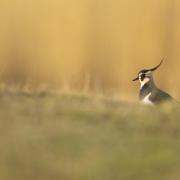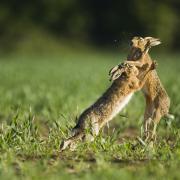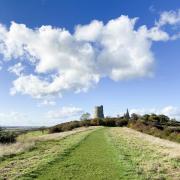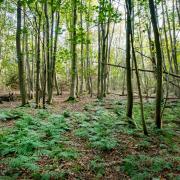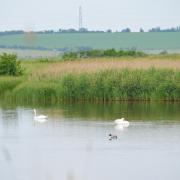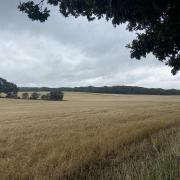Essex Life speaks to the new committee chairman of the CLA Essex Branch, Tom Streeter of Harps Farm in Great Hallingbury

Farming isn’t just about growing crops and feeding the nation – even though that aspect is an incredibly important part of the job description. For the vast majority of farmers and landowners, it is also about safeguarding the environment and working hard to sustain rural communities.
This is the view of newly-elected CLA Essex Branch committee chairman, Tom Streeter of Harps Farm in Great Hallingbury, who is concerned with not only maintaining our county’s superb countryside for the benefit of all, but is actively involved in attempting to keep the rural community alive.
Tom, 42, runs the family farming partnership in West Essex and lives on the farm, under the flight path of Stansted Airport, with his artist wife Emma and two daughters, Eloise (10) and Gracie (8). As well as working on his family’s land, Tom also shares responsibility for 1900ha of cropped arable land across Essex and in Hertfordshire as a partner in contract farming company TS Arable.
And as a Great Hallingbury parish councillor and a keen wildlife photographer, it’s fair to say that he spends an awful lot of time working on, studying and caring for the county’s rural land and community.

‘The beauty of the rural landscape, the living environment and the heritage of our buildings and communities are a national asset and need to be maintained,’ Tom explains. ‘My family are landowners within the village and own a number of the properties as well, and with my father and grandfather having been parish councillors, I felt a responsibility to be there and do as much as I can.
‘Distance has built up between people in the village because there is no pub or village shop, and we recently lost the bus service. So the parish has been looking at ways to try and develop more of a community spirit. We need that, although one could argue that we’re so close to Bishop’s Stortford, Harlow, Cambridge and London that it hardly feels like we are a rural community, even though we are.
‘The rural community is getting older and older, there are not many young families living in rural villages any more. Lack of affordable housing is a problem. One thing that proximity to London and the airport creates here is a little bit of a bubble, where the rents are higher and the property can be of an inflated price. We are lucky at the moment because our workforce of four men have worked here from their teens or twenties, and they are now all in their 50s. However, I’m not sure how we will come to replace them if and when we have to, because there is no one here to do it.’
Tom’s desire for his, and other, rural communities to survive is shared by the CLA, which believes that rural businesses have a symbiotic relationship with the countryside. The organisation, which represents farmers, landowners and rural businesses, wants investment unlocked to achieve greater productivity – driving growth, the creation of jobs and an improved standard of living across rural communities.

‘One thing that can drive investment is a positive approach to development of old farm buildings that are no longer fit for purpose. However, almost 45% of applications to convert these buildings into much-needed homes were refused in Essex last year,’ Tom explains.
‘I’m behind the CLA’s push for local planning authorities to acknowledge the real benefits of allowing these types of conversions in the countryside. We also need a new approach to delivering new homes, including affordable housing, if we are to retain and attract new people to our rural communities and ensure they are sustained.’
With farmers currently experiencing tough times, the ability to convert old buildings offers them an opportunity to innovate and diversify, creating new income streams. This is something Tom feels is vital if farmers in Essex and across the country are to survive, but he offers a cautious note for those who think this is the ‘magic bullet’ that will solve their current woes.
‘Farming is hard work and it’s even harder work recently,’ Tom says. ‘Commodity prices are low at the moment, so it’s tough. I do think diversification is vital to keep the industry buoyant, but there has to be a need for it.

‘In our area there is a need for light industrial units and if you build houses people will live in them, but in some really rural areas of Essex there won’t be the demand, there won’t be the rents or the return on investment. For those people it’s tougher than for people who can benefit from being close to an urban area.
‘Their success is also dependent on effective digital communications. Mobile and broadband coverage desperately needs improving in Essex and this is something that we need to work on. I know the frustration this can cause farmers and business owners across the county from bitter experience.’
While income is vital to all rural businesses, Tom admits that if it was all about earning a profit, then there would be very few farmers left. It runs deeper than that.
‘To get out of bed every morning is a labour of love; it is not all about making money,’ he explains. ‘British farmers have a desire to produce high quality, affordable food for the nation, and to also care for the countryside. A lot of nature is taken for granted and we farmers go out of our way, certainly my generation, to promote wildlife.’
It’s the countryside and its wildlife that really ignites Tom’s enthusiasm and he admits spending, ‘a lot of time and a few of the pennies out of the kitchen lolly pot’ pursuing his love of photographing animals such as deer, hares, and owls.
‘My main two destinations for photography, other than here on the farm, are Hatfield Forest and Stow Maries, the World War I aerodrome near Maldon. How lucky we are to have locations such as this, and the amazing coastline, on our doorsteps.’
Now, with Tom as chairman of the Essex branch of the CLA, the organisation’s members have a farmer and landowner who not only empathises with them, but also has the spirit and determination to stand up for rural businesses and communities.
‘The one thing farmers are so good at is changing with the times,’ Tom says with confidence. ‘However, they also need help and support. British agriculture is in good hands because there are some really good people at the top. As long as the people at the CLA, and others sitting on our various agricultural boards, have the energy to fight for those in rural communities, we have a chance. I certainly want the people of Essex to know that I am in their corner.’
Get in touch
To find out more about the Country Land & Business Association (CLA), visit www.cla.org.uk




